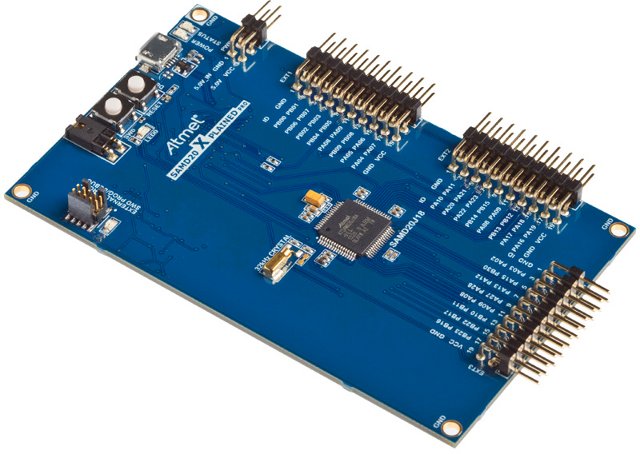Atmel has just announced its SAM D20 family of embedded Flash micro-controllers based on ARM Cortex-M0+ processor core, designed for low power applications such as home automation, consumer, smart metering and industrial applications.

The key features of Atmel SAM D20 MCUs are as follows:
- Cortex M0+ @ 48MHz, 2.14 Coremark/MHz
- Single-cycle IO access, supporting a pin toggling frequency up to 24 MHz
- Eight-channel event system
- Peripherals:
- Four to six serial communication modules (SERCOM) configurable as UART/USART, SPI or I2C
- Up to eight 16-bit Timer/Counters
- Peripheral touch controller (PTC) that supports up to 256 channels and supports buttons, sliders, wheels, and proximity
- Real Time Clock (RTC) and calendar with leap year correction
- 12-bit 350ksps ADC and 10-bit DAC
- Power Consumption:
- <150µA/MHz
- <2µA RAM retention and RTC
- Options between internal and external oscillators and on-the-fly clock switching
The family supports features 14 new devices available in 32-, 48- and 64-pin package options with 16 to 256KB of Flash memory, and 2 to 32KB RAM.

SAM D20 series is supported by the same Atmel Studio and Atmel Software Framework used for Atmel AVR MCUs. The company also providesSAM D20 Xplained Pro evaluation kit (Pictured at the top of this post) with the following specifications:
- SAMD20J18 microcontroller (64-pin package, 32KB SRAM, 256KB flash)
- One mechanical reset button
- One mechanical user pushbutton (wake-up, bootloader entry or general purpose)
- One yellow user LED
- 32.768kHz crystal
- 3 Xplained Pro extension headers
- Program/debug interface for external targets
- Embedded Debugger
- Auto-ID for board identification in Atmel Studio 6.1
- One yellow status LED
- One green board power LED
- Symbolic debug of complex data types including scope information
- Programming and debugging
- Data Gateway Interface: SPI, I²C, 4 GPIOs
- Virtual COM port (CDC)
- USB powered
- Supported with application examples in Atmel Software Framework
The Xplained PRO kit also comes pre-loaded with software that can be re-programmed, debugged and prototyped without any additional tools.
Samples of 128KB 32-pin, and 256KB 48-and 64 pin products are available in QFN and QFP packages now with pricing starting at $1.02 USD for 1K units of the 16KB, 32-pin QFN package. SAM D20 Xplained Pro kit can be purchased for $39 from Atmel Store.
Further information is available on Atmel SAM D20 microsite, and you may want to read “An intelligent remote control with Atmel’s SAM D20 under the hood” blog post to see a practical application using SAM D20 MCU.

Jean-Luc started CNX Software in 2010 as a part-time endeavor, before quitting his job as a software engineering manager, and starting to write daily news, and reviews full time later in 2011.
Support CNX Software! Donate via cryptocurrencies, become a Patron on Patreon, or purchase goods on Amazon or Aliexpress




